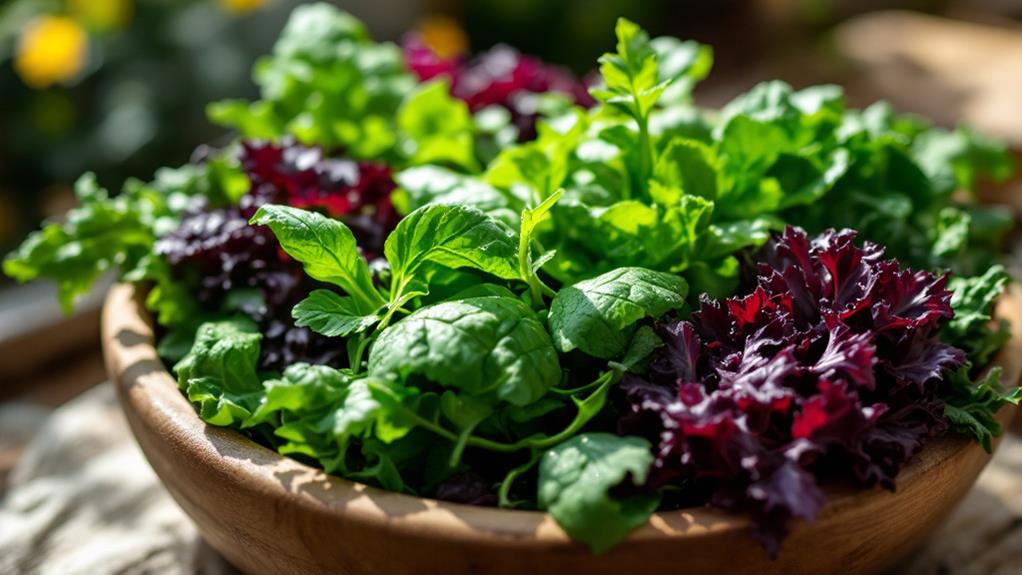Why You Need to Eat Your Greens: The Benefits of Leafy Vegetables

You need to eat your greens because they're packed with vital vitamins like A, C, and K, and minerals such as calcium and magnesium, all of which contribute to better health. Leafy vegetables are high in fiber, aiding digestion and keeping you full longer, which helps with weight management. They also contain antioxidants that fend off chronic diseases and improve your immune system. Including greens in your diet supports strong bones and lowers the risk of issues like diabetes and heart disease. Uncover easy ways to incorporate these nutritional powerhouses into your meals and enhance their health benefits.
Nutritional Powerhouse
In relation to packing a nutritional punch, leafy greens are at the top of the list. They're loaded with key vitamins like A, C, K, and several B vitamins, all essential for supporting your body's functions. These vitamins play important roles in maintaining vision, promoting bone health, and enhancing your general well-being. Not only are leafy greens low in calories, but they're also high in nutrients, making them perfect for anyone focused on weight management.
The health benefits of leafy greens extend beyond vitamins. They're packed with minerals such as calcium, magnesium, and potassium, which are crucial for muscle function, bone density, and regulating blood pressure. The dietary fiber found in these greens aids digestion, helps regulate blood sugar levels, and gives you a feeling of fullness, contributing to effective weight management.
Moreover, leafy greens are rich in antioxidants, which protect your cells from damage and reduce the risk of chronic diseases, including heart disease and certain types of cancer. By incorporating leafy greens into your diet, you not only support heart health but also take a proactive step toward a healthier lifestyle.
Boosting Immune Function
You might not immediately think of leafy greens as immune boosters, but they pack a powerful punch regarding supporting your body's defenses. Loaded with important vitamins A and C, leafy greens like spinach and kale play an important role in maintaining a robust immune function. These vitamins aren't just about keeping colds at bay—they improve your body's ability to fight infections effectively. The high antioxidant content in these greens also helps reduce oxidative stress and inflammation, which can weaken your immune response.
Additionally, leafy greens are a significant source of folate, critical for producing new cells and ensuring a healthy immune system. Regularly consuming these greens could lower your risk of chronic diseases by 30-40%, particularly those that compromise immune function. Key minerals such as iron and magnesium are present in leafy greens, supporting different immune processes and promoting overall health.
Here's why you need to incorporate more leafy greens into your diet:
- Rich in vitamins A and C
- High in antioxidants
- Significant source of folate
- Linked to reduced risk of chronic diseases
- Contains key minerals like iron and magnesium
Boost your immune health by adding leafy greens to your meals today!
Supporting Bone Health

Strengthen your bones by diving into a diet rich in leafy greens. These nutritional powerhouses play a critical role in bone health, thanks to their high content of vitamin K. This key nutrient aids in calcium absorption and bone mineralization, fundamental processes for maintaining a robust skeletal structure. Leafy greens like collard and turnip greens are particularly beneficial because they provide considerable amounts of calcium, which may help prevent conditions such as osteoporosis.
Don't underestimate the role of magnesium, another crucial bone-supporting nutrient found abundantly in spinach and Swiss chard. Magnesium contributes greatly to bone density, enhancing your overall skeletal health. Regularly consuming these greens can lead to improved bone health outcomes, reducing the risk of fractures and other bone-related diseases.
Incorporating more leafy greens into your meals complements your dairy intake, providing a balanced approach to achieving your recommended daily intake of calcium and other important nutrients. By including these greens in your diet, you're supporting your bone health on multiple fronts. Whether you're adding a handful of spinach to your smoothie or tossing Swiss chard into a salad, these simple actions can fortify your bones for the long haul.
Weight Management Benefits
While leafy greens play a considerable role in supporting bone health, they also offer impressive benefits for weight management. By incorporating these nutrient-rich vegetables into your diet, you can effectively manage your weight due to their low-calorie and low-carbohydrate nature. Leafy greens are packed with high fiber, which promotes satiety and helps prevent overeating. This means you'll feel fuller for longer, making it easier to resist those extra snacks and cravings.
With their high volume and low-calorie content, leafy greens are perfect for enhancing meal size without greatly increasing calorie intake. This supports healthy portion control, a crucial aspect of any healthy diet. They also have a low glycemic index, helping regulate blood sugar levels and preventing spikes that lead to hunger. Regular consumption of these greens is associated with healthier eating patterns and a reduced risk of obesity-related chronic diseases.
Here's how leafy greens can aid your weight management path:
- Low-calorie content: Eat more without the guilt.
- High in fiber: Promotes fullness and reduces cravings.
- Blood sugar regulation: Helps prevent hunger spikes.
- Supports healthy portion control: Increase meal volume wisely.
- Reduces risk of chronic diseases: Encourages healthier eating habits.
Reducing Disease Risk

Among the many benefits of leafy greens, their role in reducing disease risk stands out prominently. By regularly including these nutrient-packed vegetables in your diet, you can markedly reduce the risk of several serious health issues. Leafy greens are high in fiber, which aids digestion and helps regulate blood sugar levels, thereby lowering your risk of developing type 2 diabetes. The abundance of vitamins and minerals in these greens supports general health, but their disease-fighting potential truly shines with their antioxidant content.
Antioxidants, such as vitamin K and carotenoids, found in leafy greens, help protect cells from oxidative stress and inflammation, reducing the risk of cancers, including stomach, breast, and skin. Moreover, these greens are linked to a 30-40% reduced risk of colon polyps, thanks to their high folate content.
Furthermore, leafy greens are your heart's best friend. They contribute to lower blood pressure and improved endothelial function, both of which are essential in decreasing the risk of heart disease. Ultimately, studies suggest that consuming leafy greens regularly can lead to improved cognitive health, potentially reducing the risk of dementia and enhancing memory function. So, don't skimp on your greens—they're fundamental for a disease-free life.
Simple Ways to Add Greens
Your daily meals can effortlessly become healthier by incorporating leafy greens in creative ways. These greens are nutrient powerhouses that can lower the risk of different diseases. To enjoy the benefits of leafy greens, start by adding a handful of spinach to your morning smoothie. This simple inclusion provides around 12% of your daily value of manganese, giving you a healthy lift to begin your day.
For lunch or dinner, consider substituting shredded cabbage for lettuce in tacos. This not only elevates your meal's fiber content but also adds a satisfying crunch without piling on calories. If you're a salad lover, create a nutritious kale salad by massaging the leaves with dressing for 5-10 minutes. This technique makes kale more tender and digestible while retaining its high vitamin K content.
Experiment with leafy greens like Swiss chard or bok choy in your stir-fries. These greens improve flavor and provide vital vitamins A and C, crucial for immune health. Add a peppery twist to your sandwiches or pizzas with arugula, which is rich in antioxidants.
- Spinach in smoothies
- Cabbage in tacos
- Kale in salads
- Swiss chard in stir-fries
- Arugula on pizzas or sandwiches
Optimal Storage and Handling

Properly storing and handling leafy greens is vital to maintaining their freshness and nutritional value. When you bring unwashed leafy greens home, resist the urge to wash them right away. Excess moisture can cause them to spoil faster. Instead, wait until you're ready to use them. Before consumption, rinse leafy greens thoroughly under running water to remove dirt and any lingering pesticide residues. This step is essential in ensuring your greens are clean and safe to eat.
To store greens effectively, keep them in a clean refrigerator set at 40°F or cooler. This temperature is ideal to maintain freshness and prolong shelf life. To further extend their longevity, wrap your greens in a damp paper towel. Then, place them in a perforated plastic bag or an airtight container. This method helps regulate moisture levels, preventing wilting while allowing them to breathe.
For convenience, pre-washed greens are a great option. They're safe to eat straight from the package, reducing preparation time and the risk of contamination. By following these simple steps, you can enjoy crisp, fresh leafy greens to improve your meals and elevate your health.
Additional Resources for Wellness
Exploring diverse resources can greatly boost your wellness path with leafy vegetables. To truly harness the health benefits of leafy greens, tap into a variety of tools and connections. Start by signing up for health-related newsletters; they deliver fresh tips and updates on how to incorporate leafy greens into your diet. Don't underestimate the power of social media—follow accounts focused on health and nutrition for a steady stream of inspiration and recipes. This can motivate you to experiment with new fruits and vegetables in your meals.
Consider visiting local farmers' markets and signing up for cooking classes as community resources. These can improve your access to fresh leafy greens and teach you healthy cooking techniques. Immerse yourself in online articles and studies to deepen your understanding of how these greens contribute to disease prevention.
Joining health-focused groups allows you to share information and stay motivated in your nutrition expedition. Here's a quick list to get you started:
- Sign up for health newsletters
- Follow nutrition-focused social media
- Visit local farmers' markets
- Attend cooking classes
- Join health-focused groups
These resources can guide you toward a more informed and nutritious lifestyle centered around wellness.




